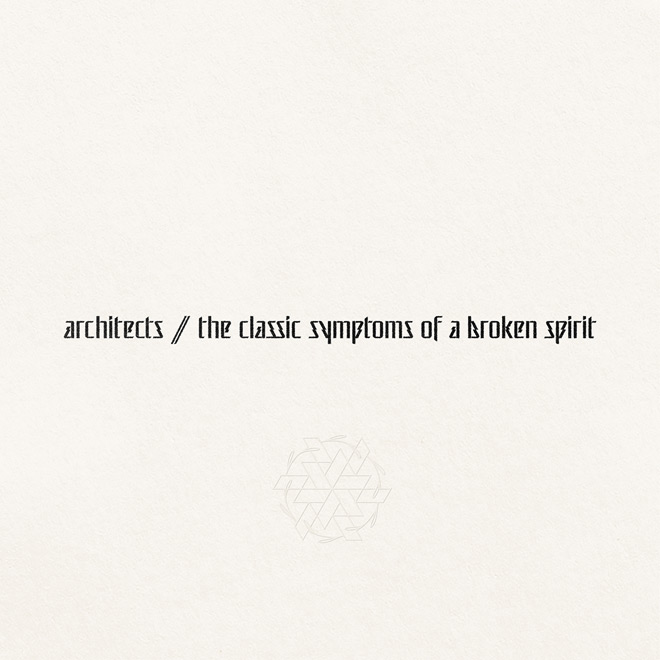Throughout the past handful of years, Britain’s crown jewel of Metalcore, Architects, has weathered personal tragedy, along with a surprising worldwide maelstrom, to deliver a pair of critically acclaimed releases. With the tide finally beginning to shift, and the Brits performing at the top of their game, they courageously launched their tenth full-length offering, The Classic Symptoms of a Broken Spirit, on October 21, 2022, via Epitaph Records.
It’s been a rough road for the quintet from Brighton, England, who formed nearly two decades ago. Representing the uppermost echelon of Metalcore (and beyond), Architects cemented their place in heavy music history with albums such as their 2006 debut, Nightmares, 2011’s The Here and Now, and 2016’s All Our Gods Have Abandoned Us. Buoyed by a deep environmental and social consciousness, along with the sincerity to tackle the deeply personal, the group’s lyrics have always provided a reflecting pool into which listeners are invited to swim toward community and awareness.
Central to this push for intelligent thought and self-accountability is a respect for our Mother Earth, both recurrent themes that weighed especially heavy on their most recent release, 2021’s acclaimed For Those That Wish To Exist. A suitable follow-up, the equally verbose The Classic Symptoms of a Broken Spirit explores the languidly fraying strands of our modern existence and its connection to “our collective trauma of hundreds of thousands of years of death, loss, and destruction” as seen through the pen of Lyricist/Drummer Dan Searle.
Produced by the band’s own Searle and Josh Middleton (guitar, vocals), 11-song The Classic Symptoms of a Broken Spirit, which features additional production from Sam Carter (vocals), was mixed by Zakk Cervini (Good Charlotte, Motionless In White). At times ironically upbeat in its bleak realities, the collection allows Architects—completed by Guitarist Adam Christianson and Bassist Alex Dean—to step beyond their current catalog and dare to toy with a more radio-friendly sound.
It’s a move that is apt to polarize long-time fans who, generally speaking, always want their heavy bands to stay pure Metal, dude. Instead, Architects have stepped outside that claustrophobic sonic space, though they stick to recurrent lyrical themes. This is definitely the case on “Burn Down My House” and its sister offering, “Living Is Killing Us,” where the Brits cycle back to our appetite for apathy. Pairing striking words with catchy choruses, the pair of songs, much like the album, comments on our lack of connection and purpose, an inability to communicate effectively with one another, and a borderline obsession with all things venomous. Musings such as “Just hear the words that I don’t say” and “We fell in love with a death machine” fit with Architects’ staple prose.
Instead, it is the sounds that are incorporated (grungy feels, sardonically upbeat percussion) that are unexpected. Album opener “Deep Fake” weaves fragile vocals around lush bass, crafting a highly-controlled look at the human species’ failure to face facts. Flip it on its side and you also have a bite into the rich and powerful who we fail to depose, avoiding confrontation to be blindly collared and dragged to our imminent demise. This angsty snarl also surfaces in the evocative rocker “Spit the Bone,” a looking glance aimed at greedy overconsumption, while “Born Again Pessimist” turns its keen eye toward the heartless figureheads that wage wars with their lies.
Of course, it’s not an all-you-can-eat cannibalistic attack on the Powers That (We Let) Be. A heavy element of self-accountability exists, asking listeners to reflect on their own contributions to our society’s troubles. “Doomscrolling,” for example, is an honest look at our collective Schadenfreude, our societal love of tragedy. And with its wholly infectious sound, “When We Were Young” is the obvious choice for a single. Lifting up Icarus as a metaphor for our over-confidence in youth, Searle manages to guide his fans toward the idea of gratitude and respect over self-satisfaction and narcissism.
But the talented Brits save much of their signature explosivity for their final threesome: “A New Moral Low Ground,” “All the Love in the World,” and the hands-down heaviest offering here, the frenetic “Be Very Afraid.” The former sees the first real blaze of rage from the band, one that propels them into the alluring musicianship of the shape-shifting “All the Love in the World.” With hard-won wisdom, the lyricist imparts some common sense: that willful ignorance fails to resolve anything; cloaking all the troubles of the world in a veil of toxic positivity won’t make anything better. Love, therefore, is waking up from your fog of apathy and actually showing, through deeds not words, that you care. Simply put: it is the album’s most powerful anthem for change.
Still, The Classic Symptoms of a Broken Spirit is not Architects’ magnum opus, nor does it appear as though it was meant to be. The courage to “rip it up and start again” after two decades of writing and recording is not something that many bands possess and, therefore, something that is worthy of respect. Yet, commendable as this approach might be, their sudden polish has softened those once deliciously raw and spontaneous edges, losing some of the fire inside. Coupled with their desire to incorporate Industrial and Electronic elements that, at times, simply appeared to mimic Bring Me the Horizon (particularly on “Tear Gas”), it all feels a little lackluster for these heavyweights.
Whether this is a one-time divergence or the beginning of a whole new era, only their next record can say. For now, and for all of the above reasons, Cryptic Rock gives Architects’ latest 4 out of 5 stars.

Architects – The Classic Symptoms of a Broken Spirit (Album Review)
Category(s)Cryptic RockCrypticRockMusic ReviewsNewsReviews
Tags2022 album2022 musicA New Moral Low GroundaccountabilityAdam ChristiansonAlex DeanAll Our Gods Have Abandoned UsAll the Love in the WorldApathyArchitectsBe Very AfraidBorn Again PessimistBritish bandBurn Down My HouseDan SearleDeep FakeDoomscrollingeat the richenvironmental consciousnessEpitaph RecordsFor Those That Wish To ExistgreedJosh MiddletonJust hear the words that I don’t sayLiving Is Killing UsmetalMetalcoreNightmaresOctober 2022 albumOctober 2022 musicOctober 2022 releaseover-confidencerockSam Cartersocial consciousnessSpit the BoneTear GasThe Classic Symptoms of a Broken SpiritThe Here and NowTraumaWe fell in love with a death machineWhen We Were YoungZakk Cervini







No comment